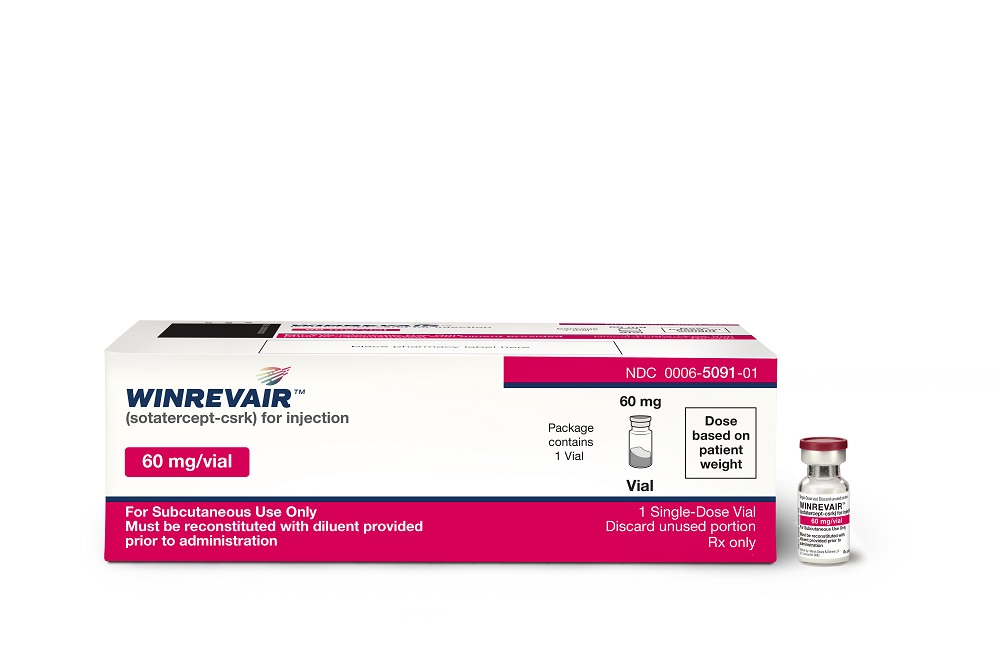Merck Drug for Heart and Lung Disorders Wins First-in-Class FDA approval
[ad_1]

The symptoms of pulmonary arterial hypertension are treated with medications that reduce the severity of the condition. FDA approval The Merck drug is the first to address the underlying cause of a disease.
The Merck drug was approved by the FDA on Tuesday for the treatment of adults with pulmonary artery hypertension (PAH), who are at intermediate or high-risk of progression. The drug is known as sotatercept and will be sold under the Winrevair brand.
Hypertension—high blood pressure—is common. PAH is a rare type of hypertension which affects the arteries that carry blood from the right-side of the heart to the lungs. The narrowing blood vessels cause the blood to flow slower and increase blood pressure. The heart has to work harder in order to pump blood into the lungs. The disease may lead to heart failure.
Patients with PAH suffer from shortness of breathe, fatigue and chest pain. As the condition progresses, it can lead to hospitalization, and even death. The drugs that are already available to treat PAH improve blood flow by relaxing or widening the blood vessels. Sotatercept was developed based on research that showed that an imbalance in cellular signaling led to the proliferation cells that thicken pulmonary vessels. In PAH patients, a protein called activin is elevated. This tipping point in cell signaling favors cell proliferation. Sotatercept, a fusion-protein engineered to trap activateins and other PAH proteins, is designed to trap these proteins.
A Phase 3 clinical study evaluated sotatercept as an alternative to standard PAH treatment. The drug was evaluated using a standard walk test to evaluate cardiovascular medications. The main objective was to measure how far patients could walk within six minutes after receiving the drug as a subcutaneous shot every three weeks for 24 weeks.
Results For the main goal, the median difference in walk distance was 34.4 m in the study drug group compared to the median of 1.0 m in the placebo groups. The study achieved statistical significance on eight of nine other secondary goals. One goal showed that Winrevair reduced death by 84% compared to placebo. The improvements lasted for 18 to 24 months after continuing treatment with the drug. The phase 3 data were Published: Last year, the New England Journal of Medicine published a study on this topic.
In a prepared statement, Dr. Aaron Waxman (executive director of the Center for Pulmonary Heart Diseases at Brigham and Women’s Hospital and investigator on Winrevair’s phase 3 study) said that new treatment options are needed for patients with hypertension pulmonary. This includes increasing exercise capacity and improving their functional class. “Sotatercept combined with background therapy could become a new standard-of-care option for patients suffering from pulmonary arterial hypertension.”
Clinical testing revealed that the most common adverse reactions reported were bleeding in the gums and nose, abnormally low levels of platelets, and higher levels of hemoglobin. Winrevair’s label instructs clinicians that they should check hemoglobin levels and platelet levels prior to the first five dosages, and then periodically thereafter. These complications can be mitigated by adjusting the dose.
Merck acquired Acceleron Pharma, a $11.5 billion company, to acquire Winrevair. In 2021. Merck needs the new PAH drug as it will be a product to compensate for revenue declines due to patent expirations later this decade on Keytruda (its top-selling cancer immunotherapy).
Merck has said that Winrevair should be available by April’s end. The drug will be available in single-vial and double-vial kits at a price of $14,000 per vial. According to the company, based on the experience of the drug during clinical trials, about two thirds of patients are expected to use the single-vial kit. Winrevair costs $242,000 annually if it is taken every three weeks. The Institute for Clinical and Economic Review is a nonprofit organization that monitors drug prices. Calculate your own cost Merck PAH would be priced between $17.900 and $35.400 per year. Merck said that a patient’s cost out-of pocket depends on a number of factors, including the details of their insurance plan. This may include a maximum out-of pocket amount.
Winrevair still undergoes regulatory review in Europe. Winrevair is undergoing clinical trials that could increase its use. Phase 3 trials are being conducted in additional groups of PAH sufferers; a Phase 2, which tests the drug for another type pulmonary hypertension, is also underway.
Merck also has a PAH drug-candidate, MK5475. This small molecule, which is formulated as an inhalable medicine, targets an enzyme that induces relaxation of blood vessel. MK-5475 has been tested in Phase 2/3. Aerovate Therapeutics Gossamer Bio Keros Therapeutics and Novartis are other companies that have PAH drugs at various stages of clinical trials.
[ad_2]


